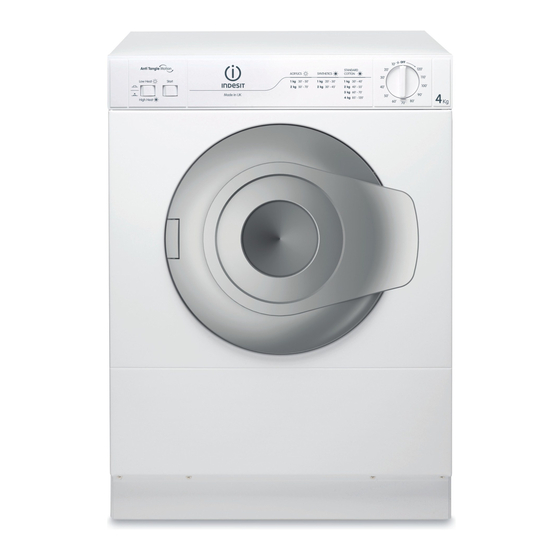Indesit NIS41V Folheto de instruções
Procurar online ou descarregar pdf Folheto de instruções para Secador Indesit NIS41V. Indesit NIS41V 4 páginas.

Instruction booklet
TUMBLE DRYER
Installation
WHERE TO PUT YOUR DRYER
The dyer should be placed where air can freely circulate
around it preferably near a window that can be opened to
reduce the possibility of condensation occurring while the
dryer is in use.
If the dryer is enclosed or fitted under a work
surface a gap of at least 50 mm (2") must be
allowed above the top for the full width of the
dryer and at least 25 mm (1") either side. This
allows air to enter into the rear air inlet. The
dryer must never be run in a cupboard with a
closed door.
ELECTRICAL CONNECTIONS
The socket must be grounded. The power supply cord
should be checked periodically and, if required, replaced by
a cord specially prepared for this dryer.
!
Failure to clean the filter after EVERY
drying cycle will affect the drying
performance of your machine.
FLUFF FILTER
You must clean
the fluff filter after
EVERY
drying
cycle.
To remove the filter
Step 1
- Open the
door of your dryer,
remove the filer.
Step 2
- Clean any
fluff deposits from
the filter mesh, and
refit the filter.
- Make sure
Step 3
the filter is pushed
fully home -
NEVER
run the dryer without
the filter in position.
The dryer must never be installed behind a lockable door, a
sliding door or a door with a hinge on the opposite side to that
of the dryer door.
This symbol reminds you to read this booklet.
VENTILATION
When the dryer is in use there has to be adequate
ventilation to avoid the back flow of gases into the room
from appliances burning other fuels, including open fires.
The vent tube should not exceed 2.4 metres in length.
The tube should be kept clear of the air intake vent and kinks
or 'U' bends must be avoided as these will obstruct the tube
and trap condensation.
Laundry
MAX LOAD SIZE
Do not load more than maximum capacity.
These numbers refer to dry weight:
Natural fibres: 4kg max
Synthetic fibre: 2kg max
WASH CARE LABELS
Look at the labels on your garments, especially when tumble drying
for the first time. The following symbols are the most common:
May be tumble dried
Do
tumble dry
NOT
Tumble dry at high heat setting
Tumble dry at low heat setting
ITEMS NOT SUITABLE FOR TUMBLE
DRYING
1. Articles that contain rubber or rubber-like materials or plastic
film, any flammable articles or objects that contain flammable
substances.
2. Glass fibres.
3. Items which have been dry cleaned.
4. Large bulky items (quilts, sleeping bags, etc). These expand
when drying and prevent airflow through the dryer.
